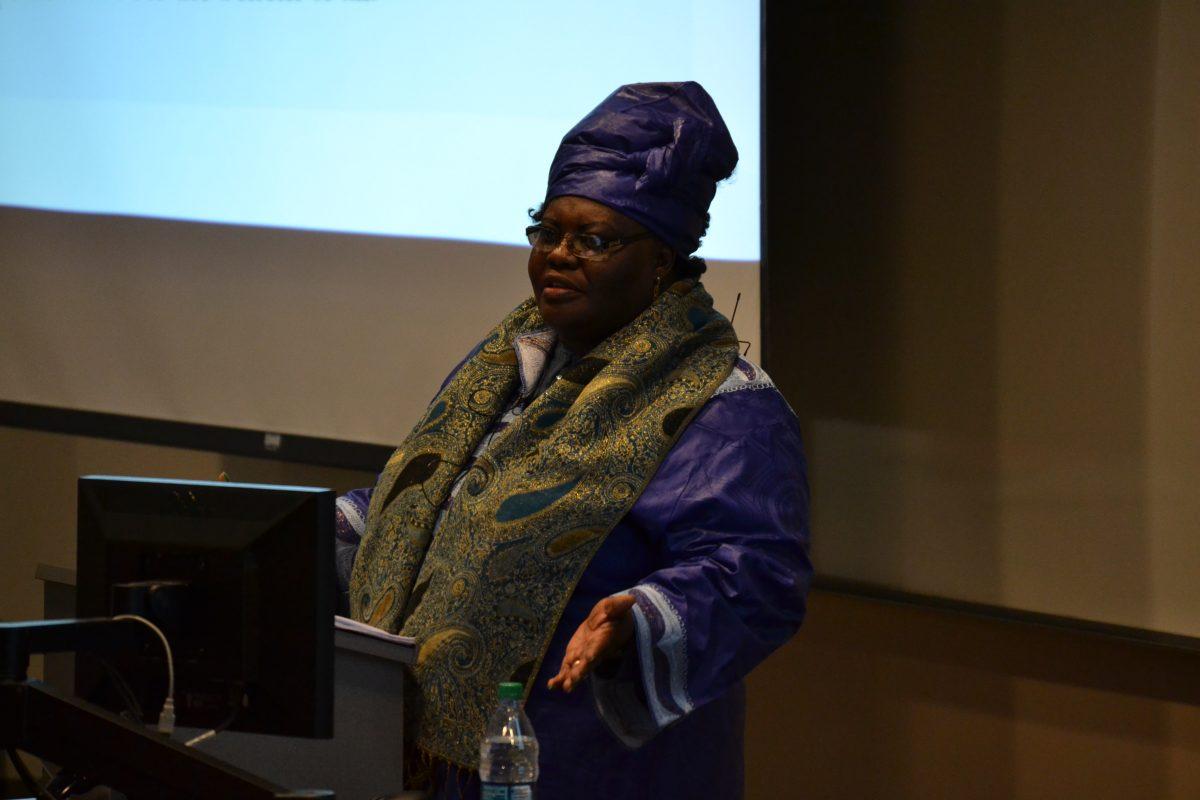The 2014 Diplomat in Residence for the School of Public and International Affairs answered difficult questions about how to bring peace to war-stricken countries and addressed the need for justice against tyrannical leaders during a lecture Tuesday in Withers Hall.
Henrietta Mensa-Bonsu’s lecture, titled “Confronting the Past to Shape the Future: Transitional Justice Issues and Post-Conflict Recovery,” explored different ways to bring order and justice to countries struggling to transition after years of violence and conflict.
Mensa-Bonsu said that transitional justice is a difficult process because it demands accountability, resurfaces troubling memories of conflict and must answer questions about how to bring perpetrators to justice.
However, Mensa-Bonsu said the most difficult aspect of transitional justice is deciding whether or not to grant pardons to oppressive leaders who need to be taken out of power.
“If a pardon were granted in the name of peace, would it promote peace or would it deepen the culture of impunity which may have provoked the crisis to begin with?” Mensa-Bonsu said.
Though pardons may cause some warlords to resist laying down their weapons for fear of harsh trials thereafter, Mensa-Bonsu said that it’s vital to not ignore justice.
“You simply cannot act a certain way and get away with it,” Mensa-Bonsu said. “Gross human rights abuses have to be accounted for, but at the same time you are looking at a broken society and need to get it to move again.”
Additionally, Mensa-Bonsu said easing the punishments for oppressive leaders risks giving other world leaders the incentive to act in similar ways.
“There are no easy answers here,” Mensa-Bonsu said. “Grant amnesty and achieve peace and set a bad example, or get them to account and risk a return to the conflict”
Mensa-Bonsu said the best course for post-conflict countries to take is one that would sustain peace until the society’s capacity for managing internal differences and fierce controversy can be handled better.
Quillian Anderson, a freshmen in First Year College, said that the questions Mensa-Bonsu discussed concerning justice were thought-provoking and important to discuss.
“I have never thought about just how connected the ideas of maintaining stability and implementing justice actually were,” Anderson said. “It has made me see conflicts in these countries much differently and more complexly than I did before.”
Mensa-Bonsu also discussed the pros and cons of using truth commissions as a means of making leaders responsible for their actions.
Truth commissions are inquiries concerning the physical actions, root causes and societal consequences of the human rights violations performed by the leader in question. They are a way to bring justice and reform to a troubled government as well as peace of mind to the victims of atrocities, Mensa-Bonsu said.
Mensa-Bonsu said that truth commissions are a good means of obtaining justice because they are accessible to all citizens and allow a victim to feel a sense of empowerment and psychological restoration once a perpetrator confesses his or her crimes.
However, according to Mensa-Bonsu, the truth commissions often have skirting accountability and are sometimes unable to secure the participation and show genuine contriteness of perpetrators.
According to Mallory Deeter, a sophomore in history, Mensa-Bonsu discussed issues in her lecture that were very important for some western-minded members of the University to think about.
“I was really interested when she spoke about the pros and cons of truth commissions,” Deeter said. “She was very honest and addressed both sides of the argument. I appreciated how educated she was and how she shared her personal experiences about a topic that is so relevant in the world today.”
Mensa-Bonsu is the Director of the Legon Centre for International Affairs and Diplomacy as well as a professor of law at University of Ghana, Legon.








